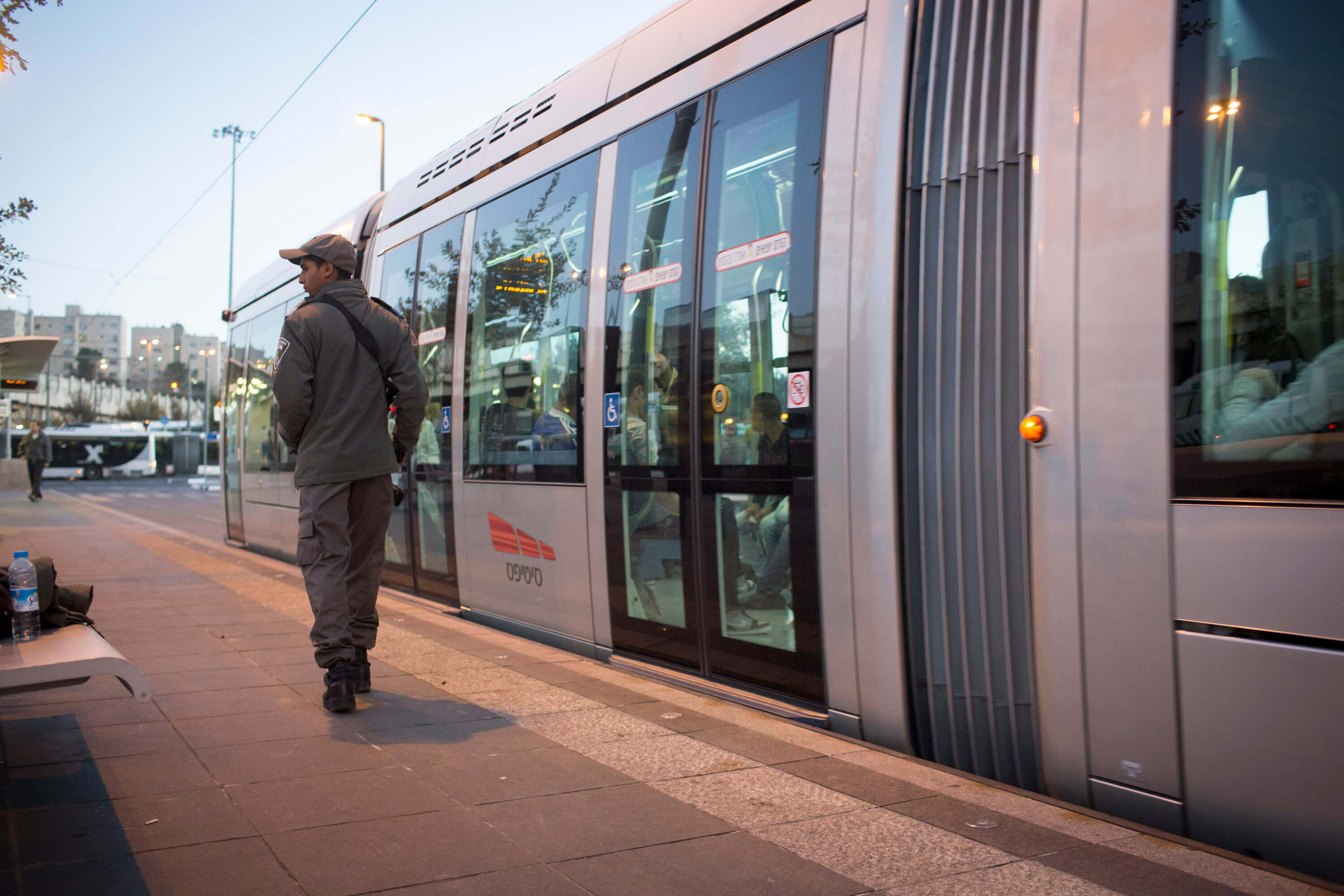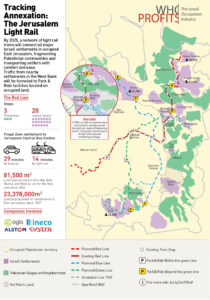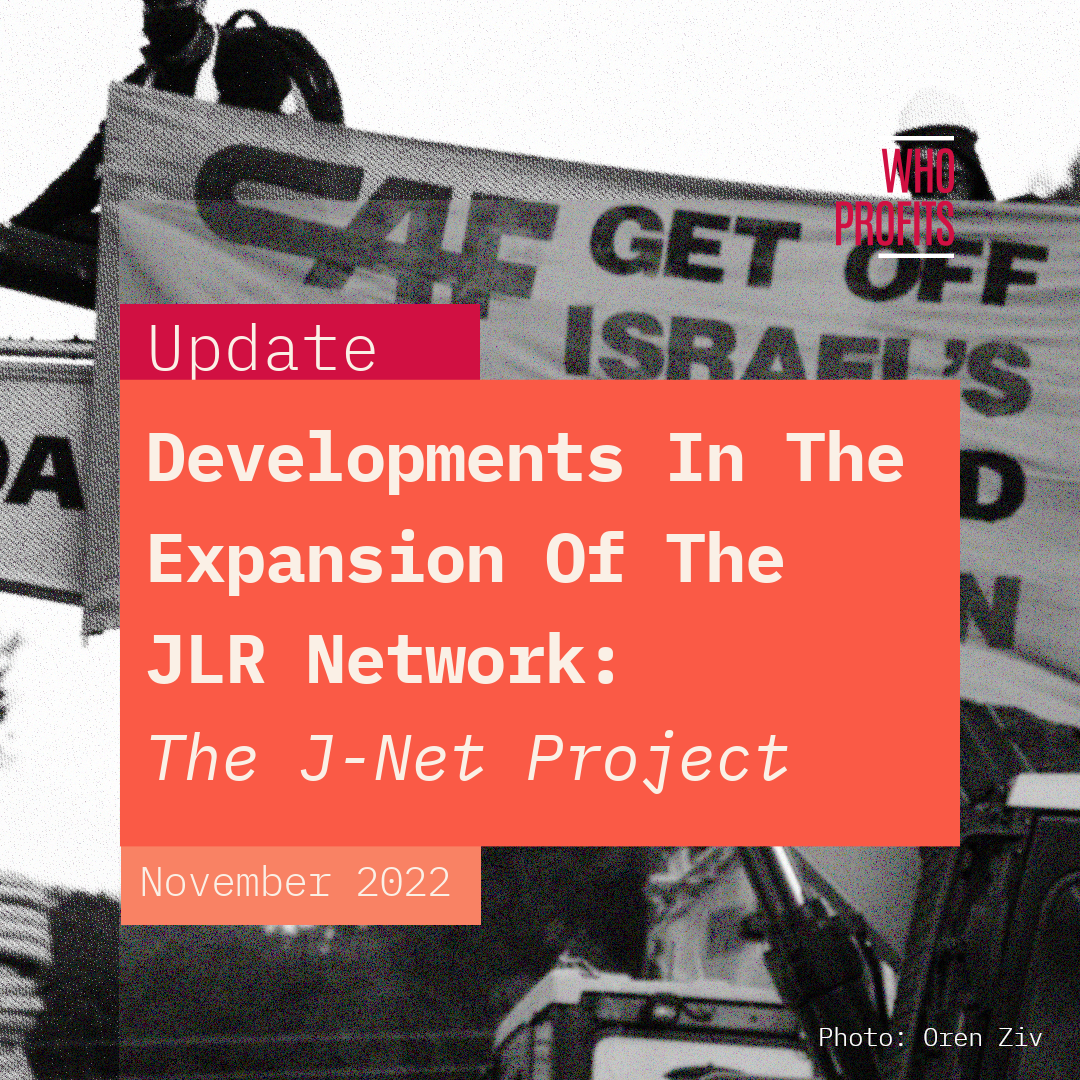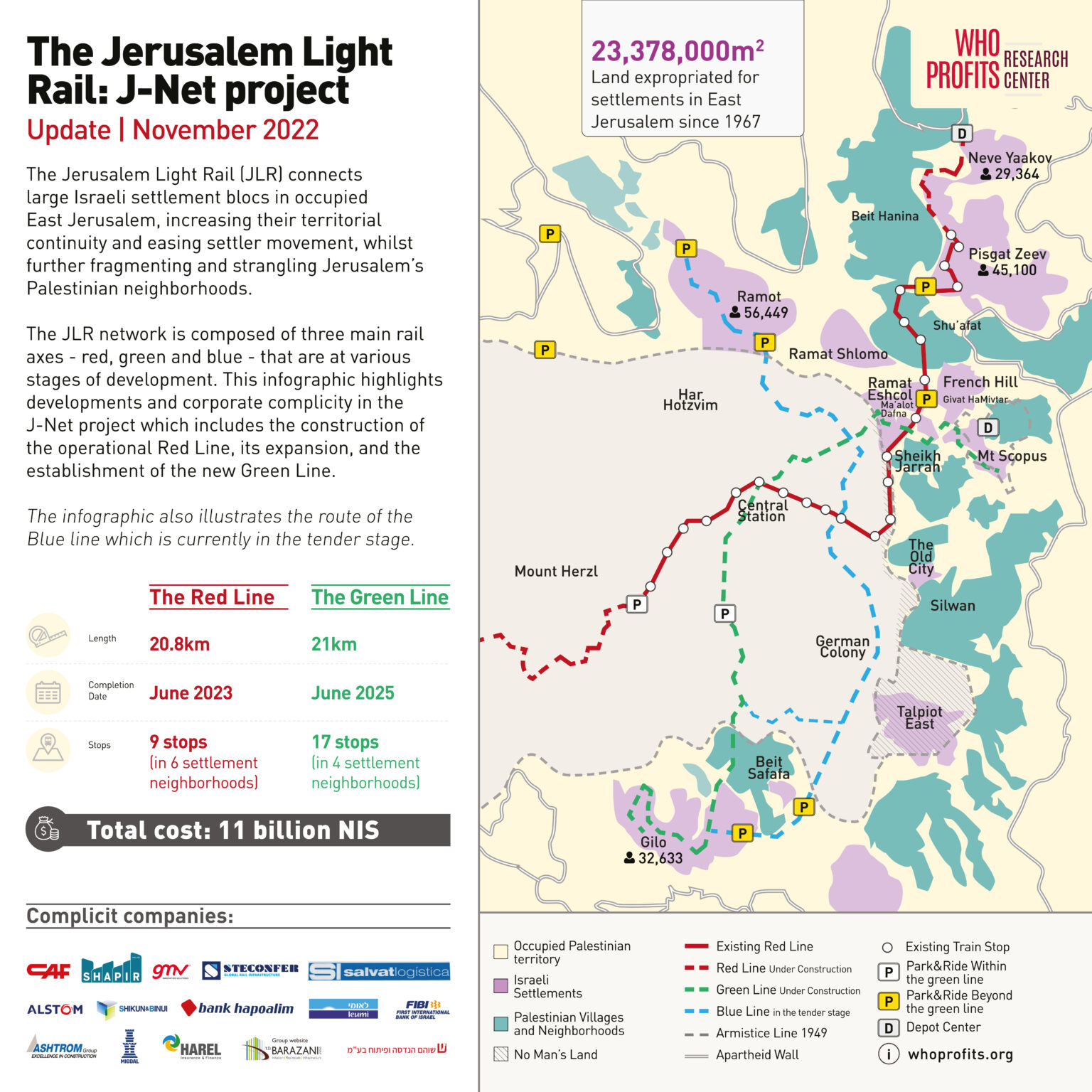CAF- Construcciones y Auxiliar de Ferrocarriles

Full Text
Head office: José Miguel Iturrioz, 26, 20200 Beasain, Guipúzcoa, Spain. Tel.: +34 943 880 100
A publicly-traded Spanish company specializing in designing and implementing transit systems, and manufacturing railway vehicles, equipment, and buses. CAF provides project and engineering management that include system design, civil work, signalling, electrification and other electromechanical systems, rolling stock supply and system operation and maintenance.
The Jerusalem Light Rail
CAF holds 50% in CFIR Light Rail Ltd., the consortium that operates the Jerusalem Light Rail (JLR) network, jointly owned with its Israeli partner Shapir Engineering and Industry. CAF also holds 50% in LAVI Light Rail O&M Ltd. (formerly J-Net O&M Ltd), the Operation and Maintenance contractor of the JLR project.
The Jerusalem Light Rail network is a large-scale Israeli transport infrastructure project connecting large settlement blocks in occupied East Jerusalem to the center of the city and its western side, creating territorial continuity and easing settler movement on both sides of the Green Line.
J-Net Project
In 2019, CAF and Shapir, through their jointly owned consortium CFIR Light Rail, won a tender from the Israeli Ministry of Finance, the Ministry of Transportation and the Jerusalem Municipality for the J-Net project to expand the JLR network. The J-Net project, estimated at NIS 11 billion, includes the extension, operation and maintenance of the existing Red Line, and the construction, operation and maintenance of the Green Line. The tender includes the operation and maintenance of both lines, for a period of 15 years (with an option for additional 10 years) and for 25 years, respectively. In April 2021, the consortium commenced the 15-year concession to operate the two lines.
For more on the J-Net project see Who Profits Update: Developments in the expansion of the JLR network: The J-Net project.
Red Line
The JLR Red Line, operational since 2011, connects the settlement neighborhood of Pisgat Ze'ev in occupied East Jerusalem to the city center, passing through the settlement neighborhoods of French Hill, Givat HaMivtar, Ramat Eshkol and Ma’alot Dafna.
CAF’s subsidiary, CFIR Light Rail, has carried out the extension of the Red Line in East Jerusalem, including the construction of seven additional kilometers of double tracks and 12 new stations between the settlement neighborhoods of Pisgat Ze`ev and Neve Yaakov in East Jerusalem.
In May 2023, the company began operating test drives along the extended line reaching Neve Ya'akov, which will continue until the full commercial operation of the full line, expected to start in 2024. The new trains include the upgraded carriages and the new “Orbus 100” model trains manufactured by CAF.
In November 2021, CAF began the construction work in the settlement neighborhoods of Pisgat Ze’ev and Neve Ya’akov, and the construction of a new depot in Neve Ya’akov. In January 2022, the company began laying the track between the two settlement neighborhoods.
Green Line
The Green Line will connect Gilo settlement neighborhood to Mt. Scopus, passing through the city center and the settlement neighborhoods of Ramat Eshkol, Ma’alot Dafna and the French Hill, significantly easing access between the settlement and the western part of the city.
CFIR has carried out the laying of rails, concrete casting and electrification along the Red Line and the Green Line’s routes, and is expected to soon begin work in the Gilo settlement neighborhood area.
In April 2022, the Jerusalem municipality signed an agreement with CAF and Shapir to reward the companies with NIS 10 million for each month of advancement of work on the Green Line. The agreement stipulates that for every month that the company is ahead of schedule, it will receive NIS 5 million plus all income from the purchase of tickets, which is estimated at an additional NIS 5 million.
CAF train cars
CAF is also the provider of the JLR's train cars. According to the J-Net tender, CAF will design and provide 114 train cars (57 sets of train pairs) for the new Green Line, and refurbish 46 trains that are already in service on the Red Line, at an estimated cost of EUR 3 million per train - a total of about NIS 1.2 billion. CAF will also supply the signalling, energy, and communication systems.
By March 2023, CAF has delivered 13 new train cars for the JLR, and is expected to deliver the remaining by the year 2025.
CAF has contracted the Spanish company Salvat Logistica to co-manage the maritime transport of the train cars for the JLR project.
In May 2022, two CAF trains new model URBOS100 arrived from CAF factory in Spain to the port of Ashdod and from there to the depot in the French Hill settlement neighborhood. Additional trains that will arrive will be absorbed in the new depot in Neve Ya’akov settlement neighborhood.
In 2022, the CFIR Light Rail consortium received NIS 102,073,186 from the Israeli Ministry of Transportation for the Green Line project. In 2021, the consortium received from the Ministry NIS 102,702,185 for the Green Line project and NIS 806,062 for the provision of light rail public transport service in Jerusalem. In 2020, CFIR consortium received an additional NIS 70,909,395 for the Green Line.
A publicly-traded Spanish company specializing in designing and implementing transit systems, and manufacturing railway vehicles, equipment, and buses. CAF provides project and engineering management that include system design, civil work, signalling, electrification and other electromechanical systems, rolling stock supply and system operation and maintenance.
The Jerusalem Light Rail
CAF holds 50% in CFIR Light Rail Ltd., the consortium that operates the Jerusalem Light Rail (JLR) network, jointly owned with its Israeli partner Shapir Engineering and Industry. CAF also holds 50% in LAVI Light Rail O&M Ltd. (formerly J-Net O&M Ltd), the Operation and Maintenance contractor of the JLR project.
The Jerusalem Light Rail network is a large-scale Israeli transport infrastructure project connecting large settlement blocks in occupied East Jerusalem to the center of the city and its western side, creating territorial continuity and easing settler movement on both sides of the Green Line.
J-Net Project
In 2019, CAF and Shapir, through their jointly owned consortium CFIR Light Rail, won a tender from the Israeli Ministry of Finance, the Ministry of Transportation and the Jerusalem Municipality for the J-Net project to expand the JLR network. The J-Net project, estimated at NIS 11 billion, includes the extension, operation and maintenance of the existing Red Line, and the construction, operation and maintenance of the Green Line. The tender includes the operation and maintenance of both lines, for a period of 15 years (with an option for additional 10 years) and for 25 years, respectively. In April 2021, the consortium commenced the 15-year concession to operate the two lines.
For more on the J-Net project see Who Profits Update: Developments in the expansion of the JLR network: The J-Net project.
Red Line
The JLR Red Line, operational since 2011, connects the settlement neighborhood of Pisgat Ze'ev in occupied East Jerusalem to the city center, passing through the settlement neighborhoods of French Hill, Givat HaMivtar, Ramat Eshkol and Ma’alot Dafna.
CAF’s subsidiary, CFIR Light Rail, has carried out the extension of the Red Line in East Jerusalem, including the construction of seven additional kilometers of double tracks and 12 new stations between the settlement neighborhoods of Pisgat Ze`ev and Neve Yaakov in East Jerusalem.
In May 2023, the company began operating test drives along the extended line reaching Neve Ya'akov, which will continue until the full commercial operation of the full line, expected to start in 2024. The new trains include the upgraded carriages and the new “Orbus 100” model trains manufactured by CAF.
In November 2021, CAF began the construction work in the settlement neighborhoods of Pisgat Ze’ev and Neve Ya’akov, and the construction of a new depot in Neve Ya’akov. In January 2022, the company began laying the track between the two settlement neighborhoods.
Green Line
The Green Line will connect Gilo settlement neighborhood to Mt. Scopus, passing through the city center and the settlement neighborhoods of Ramat Eshkol, Ma’alot Dafna and the French Hill, significantly easing access between the settlement and the western part of the city.
CFIR has carried out the laying of rails, concrete casting and electrification along the Red Line and the Green Line’s routes, and is expected to soon begin work in the Gilo settlement neighborhood area.
In April 2022, the Jerusalem municipality signed an agreement with CAF and Shapir to reward the companies with NIS 10 million for each month of advancement of work on the Green Line. The agreement stipulates that for every month that the company is ahead of schedule, it will receive NIS 5 million plus all income from the purchase of tickets, which is estimated at an additional NIS 5 million.
CAF train cars
CAF is also the provider of the JLR's train cars. According to the J-Net tender, CAF will design and provide 114 train cars (57 sets of train pairs) for the new Green Line, and refurbish 46 trains that are already in service on the Red Line, at an estimated cost of EUR 3 million per train - a total of about NIS 1.2 billion. CAF will also supply the signalling, energy, and communication systems.
By March 2023, CAF has delivered 13 new train cars for the JLR, and is expected to deliver the remaining by the year 2025.
CAF has contracted the Spanish company Salvat Logistica to co-manage the maritime transport of the train cars for the JLR project.
In May 2022, two CAF trains new model URBOS100 arrived from CAF factory in Spain to the port of Ashdod and from there to the depot in the French Hill settlement neighborhood. Additional trains that will arrive will be absorbed in the new depot in Neve Ya’akov settlement neighborhood.
In 2022, the CFIR Light Rail consortium received NIS 102,073,186 from the Israeli Ministry of Transportation for the Green Line project. In 2021, the consortium received from the Ministry NIS 102,702,185 for the Green Line project and NIS 806,062 for the provision of light rail public transport service in Jerusalem. In 2020, CFIR consortium received an additional NIS 70,909,395 for the Green Line.
Be a part of our community
Join Our Mailing List
CAF- Construcciones y Auxiliar de Ferrocarriles
Head office: José Miguel Iturrioz, 26, 20200 Beasain, Guipúzcoa, Spain. Tel.: +34 943 880 100
A publicly-traded Spanish company specializing in designing and implementing transit systems, and manufacturing railway vehicles, equipment, and buses. CAF provides project and engineering management that include system design, civil work, signalling, electrification and other electromechanical systems, rolling stock supply and system operation and maintenance.
The Jerusalem Light Rail
CAF holds 50% in CFIR Light Rail Ltd., the consortium that operates the Jerusalem Light Rail (JLR) network, jointly owned with its Israeli partner Shapir Engineering and Industry. CAF also holds 50% in LAVI Light Rail O&M Ltd. (formerly J-Net O&M Ltd), the Operation and Maintenance contractor of the JLR project.
The Jerusalem Light Rail network is a large-scale Israeli transport infrastructure project connecting large settlement blocks in occupied East Jerusalem to the center of the city and its western side, creating territorial continuity and easing settler movement on both sides of the Green Line.
J-Net Project
In 2019, CAF and Shapir, through their jointly owned consortium CFIR Light Rail, won a tender from the Israeli Ministry of Finance, the Ministry of Transportation and the Jerusalem Municipality for the J-Net project to expand the JLR network. The J-Net project, estimated at NIS 11 billion, includes the extension, operation and maintenance of the existing Red Line, and the construction, operation and maintenance of the Green Line. The tender includes the operation and maintenance of both lines, for a period of 15 years (with an option for additional 10 years) and for 25 years, respectively. In April 2021, the consortium commenced the 15-year concession to operate the two lines.
For more on the J-Net project see Who Profits Update: Developments in the expansion of the JLR network: The J-Net project.
Red Line
The JLR Red Line, operational since 2011, connects the settlement neighborhood of Pisgat Ze'ev in occupied East Jerusalem to the city center, passing through the settlement neighborhoods of French Hill, Givat HaMivtar, Ramat Eshkol and Ma’alot Dafna.
CAF’s subsidiary, CFIR Light Rail, has carried out the extension of the Red Line in East Jerusalem, including the construction of seven additional kilometers of double tracks and 12 new stations between the settlement neighborhoods of Pisgat Ze`ev and Neve Yaakov in East Jerusalem.
In May 2023, the company began operating test drives along the extended line reaching Neve Ya'akov, which will continue until the full commercial operation of the full line, expected to start in 2024. The new trains include the upgraded carriages and the new “Orbus 100” model trains manufactured by CAF.
In November 2021, CAF began the construction work in the settlement neighborhoods of Pisgat Ze’ev and Neve Ya’akov, and the construction of a new depot in Neve Ya’akov. In January 2022, the company began laying the track between the two settlement neighborhoods.
Green Line
The Green Line will connect Gilo settlement neighborhood to Mt. Scopus, passing through the city center and the settlement neighborhoods of Ramat Eshkol, Ma’alot Dafna and the French Hill, significantly easing access between the settlement and the western part of the city.
CFIR has carried out the laying of rails, concrete casting and electrification along the Red Line and the Green Line’s routes, and is expected to soon begin work in the Gilo settlement neighborhood area.
In April 2022, the Jerusalem municipality signed an agreement with CAF and Shapir to reward the companies with NIS 10 million for each month of advancement of work on the Green Line. The agreement stipulates that for every month that the company is ahead of schedule, it will receive NIS 5 million plus all income from the purchase of tickets, which is estimated at an additional NIS 5 million.
CAF train cars
CAF is also the provider of the JLR's train cars. According to the J-Net tender, CAF will design and provide 114 train cars (57 sets of train pairs) for the new Green Line, and refurbish 46 trains that are already in service on the Red Line, at an estimated cost of EUR 3 million per train - a total of about NIS 1.2 billion. CAF will also supply the signalling, energy, and communication systems.
By March 2023, CAF has delivered 13 new train cars for the JLR, and is expected to deliver the remaining by the year 2025.
CAF has contracted the Spanish company Salvat Logistica to co-manage the maritime transport of the train cars for the JLR project.
In May 2022, two CAF trains new model URBOS100 arrived from CAF factory in Spain to the port of Ashdod and from there to the depot in the French Hill settlement neighborhood. Additional trains that will arrive will be absorbed in the new depot in Neve Ya’akov settlement neighborhood.
In 2022, the CFIR Light Rail consortium received NIS 102,073,186 from the Israeli Ministry of Transportation for the Green Line project. In 2021, the consortium received from the Ministry NIS 102,702,185 for the Green Line project and NIS 806,062 for the provision of light rail public transport service in Jerusalem. In 2020, CFIR consortium received an additional NIS 70,909,395 for the Green Line.
Ownership
The company is publicly traded on the Madrid Stock Exchange under the ticker symbol: CAF.
Major shareholders include: Cartera Social SA (24.04%), Kutxabank SA (14.06%), Indumenta Pueri SL (5.02%), Daniel Bravo Andreu (5%), Instituto Vasco de Finanzas SL (3%), Santander Asset Management SA SGIIC (2.7%), The Vanguard Group, Inc. (1.9%), Norges Bank Investment Management (1.5%), Invesco Advisers, Inc. (1.26%).
President: Andrés Arizkorreta García
CEO: Javier Martínez Ojinaga
Subsidiaries
The company has 57 subsidiaries worldwide.
Israeli subsidiaries: CAF Israel Rails Ltd. (100%), LAVI Light Rail O&M Ltd. (50%), Light LTV NTA Ltd. (50%), PL Light Rail Maintenance Ltd. (50%).
Partners
Shapir Engineering and Industry, GMV Innovating Solutions, Steconfer, Salvat Logistica, HSBC Bank, Leumi Bank, Hapoalim Bank
* This section refers to the company's general business partners







